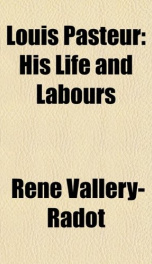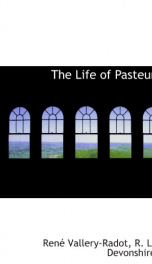louis pasteur his life and labours

Purchase of this book includes free trial access to www.million-books.com where you can read more than a million books for free. This is an OCR edition with typos. Excerpt from book: 89 THE QUESTION OF SPONTANEOUS GENERATION. ' All dry bodies,' said Aristotle,' which become damp, and all damp bodies which are dried, engender animal life.' Bees, according to Virgil, are produced from the corrupted entrails of a young bull. At the time of Louis XIV. we were hardly more advanced. A celebrated alchemist doctor, Van Helmont, wrote: ' The smells which rise from the bottom of morasses produce frogs, slugs, leeches, grasses, and other things.' But most extraordinary of all was the true recipe given by Van Helmont for producing a pot of mice. It suffices to press a dirty shirt into the orifice of a vessel containing a little corn. After about twenty-one clays, the ferment proceeding from the dirty shirt modified by the odour of the corn effects the transmutation of the wheat into mice. Van Helmont, who asserted that he had witnessed the fact, added with assurance: ' The mice are born full grown; there are bothmales and females. To reproduce the species it suffices to pair them.' ' Scoop out a hole,' said he again, ' in a brick, put into it some sweet basil, crushed, lay a second brick upon the first so that the hole may be perfectly covered. Expose the two bricks to the sun, and at the end of a few days the smell of the sweet basil, acting as a ferment, will change the herb into real scorpions. An Italian naturalist, Eedijvas the first to subject this question of spontaneous generation to a more attentive examination. He showed that maggots in meat are not spontaneously generated, but that they are the larvae of flies' eggs. To prevent the production of maggots, Eedi showed that it was only necessary to surround the meat with fine gauze before exposing it to the air. As no flies could alight upon meat thus protected, there were no eggs deposited, and conse...
Info about the book
Author:
Series:
Unknown
ISBN:
0226820068
Rating:
5/5 (9)Your rating:
0/5
Languge:
English
Users who have this book
Users who want this book
What readers are saying
What do you think? Write your own comment on this book!
write a commentif you like louis pasteur his life and labours try:
Other books by this author
Do you want to exchange books? It’s EASY!
Get registered and find other users who want to give their favourite books to good hands!


